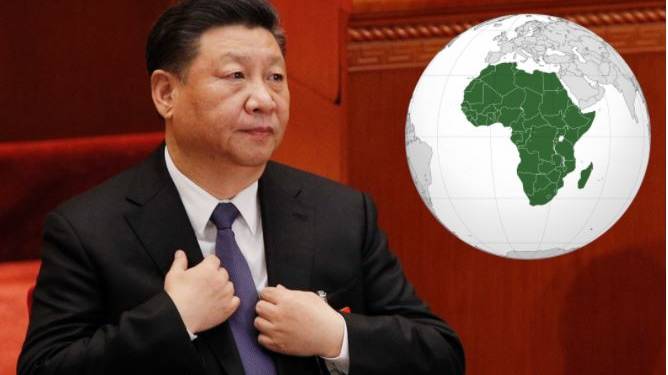
After using debt trap diplomacy, China is trying to impose Mandarin in Africa but Africa will have none of it
No thank you, says Africa
by Abhinav SinghThe People Republic of China and its neo-colonial dreams of creating world-hegemony through its ambitious Belt and Roads Initiative (BRI) has already derailed in several African countries, as reported extensively by TFI. However, a new development has come into light that will further give a blow to Xi Jinping’s psychedelic hallucinations. Africa has outrightly boycotted the imposition of Mandarin upon it and thus Middle-kingdom’s backdoor tactic of ‘Zombie-fying’ a population has failed spectacularly.
According to a report in South China Morning Post, only a small percentage of Africans see Mandarin as the most important international language for young people to learn and hence are not preferring to take it up.
In a poll of about 2,000 people by Afrobarometer, a research network that provides data on Africans’ experiences, only 2 percent of those surveyed said Mandarin was the most important international language to learn.
About 70 percent said English, 14 percent said French, 4 percent said Arabic and the remainder said “other”. And that is despite the number of Africans attending university in China soaring from 1,793 in 2003 to 81,562 in 2018.
The African students are waking up to China’s delirious plans of converting the African workforce into its slave by making it force-feed Mandarin. China wants to use the Mandarin-speaking African populace to carry out the heavy grunt work in their native countries all whilst being servile to its Chinese masters.
Just the way the British imposed English in India during the colonial rule to manufacture clerks and officers that could help them govern such a large country, China is using a similar tactic.
“We see that in Kenya, Namibia and Angola they (students) are particularly concerned about being heavily indebted to China,” Afrobarometer director of capacity building Edem Selormey said. China is not only the biggest trading partner of the African Continent but also its largest creditor. As a whole, Africa owes 150 billion US dollars to China.
And if any layman thought China was helping the African youth by gifting them the language of Mandarin, then they are sadly mistaken.
The red authoritarian regime loathes Black and while almost everyone is aware of racism in Western nations like the US, UK, and others, almost nobody bats an eye towards xenophobia prevalent in China, particularly against those who do not have a white skin-tone. In fact, China is by far the most racist country in the world. Racism and hatred for the ‘black’ is deeply ingrained in the Chinese psyche.
In Guangzhou’s Yuexiu district which is also known as “Little Africa”, Africans and people suspected to be in contact with ‘African contacts’ were compelled to take COVID tests followed by a mandatory quarantine at their own expense in April. The blacks are also routinely thrown out of their rooms and hotels in China.
The US Consulate in Guangzhou had advised African-Americans to stop traveling to the city in the backdrop of the Chinese Communist Party targeting people of African origin under the pretext of cracking down on the Wuhan coronavirus.
Mongolia and its fight in resisting Mandarin imposition
However, Africa is not the first example where China has looked to impose its language so as to hold greater leverage in controlling the masses. As China seeks to establish linguistic and racial homogeneity by imposing Mandarin and encouraging Han Chinese domination, different parts of the Communist country are rising in rebellion.
Reported by TFI, apart from Tibet and Xinjiang, Inner Mongolia is now coming into the limelight as the occupied Chinese territory is now standing up to Chinese colonialism.
As per recent reports, popular protests have erupted in China’s Northern Region of Inner Mongolia. Thousands of ethnic Mongolian students and parents are protesting as the Chinese Communist Party phases out Mongolian-medium teaching in the Inner Mongolian schools.
The protests are likely to reignite the Inner Mongolian Independence Movement that seeks the establishment of an independent Inner Mongolian State or reunification of Mongolia as a whole, by separating from China.
Chinese actions in Mongolia reek of CCP General-Secretary Xi Jinping’s brutal policy of repression to established Han Chinese hegemony over minority cultures and races. The changes being made in Mongolia resemble those which have been made in Tibet and Xinjiang.
Nepal and its love for Mandarin
In India’s neighbourhood, the Himalayan country of Nepal continues to be swayed by China’s money power. It was reported last year that the KP Oli government had agreed to promote Mandarin in Nepalese schools.
According to a report in Kathmandu Post, the Ministry of Education signed a memorandum of understanding with the Chinese Embassy in Nepal on Volunteer Chinese Teachers’ Programme in Nepal
The assurance by China that it will pay for teachers’ salaries have further encouraged many private schools to include Mandarin as a mandatory subject.
Imposing language—a tried and tested formula for colonizing a country
Since 2013, the BRI has become the centerpiece of Xi’s ambitious drive to make China a global hegemon, and it was integrated into the CCP charter at its 19th Congress in 2017.
Xi has promoted the BRI as an enterprise that will “deliver benefits well beyond China’s borders. However, Jinping’s statements and actions have been high on rhetoric and low on substance.
By imposing its language and taking away the sovereignty of the countries through shark loans, the CCP regime is looking to emulate its Xinjiang model of imperialism in Africa. However, the dark-continent has shown that it will not cave-in easily to China’s devious plans.